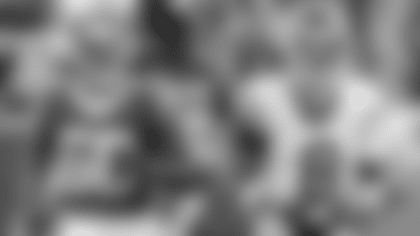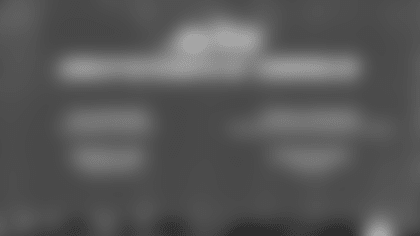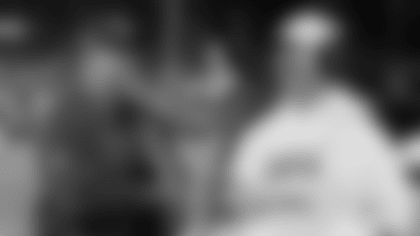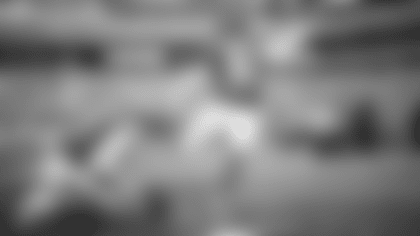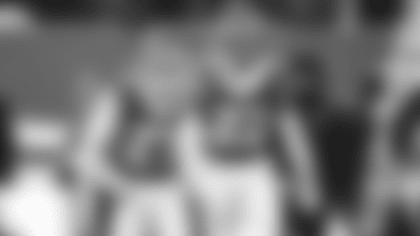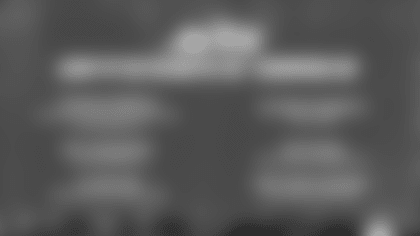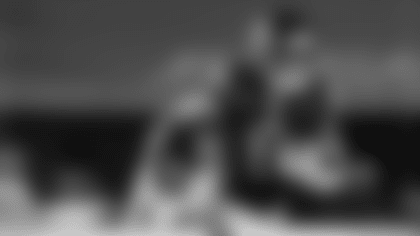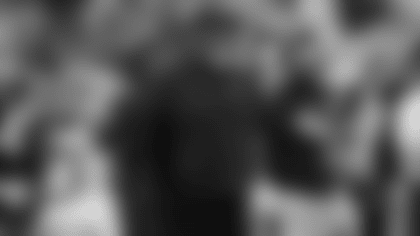New York Jets head coach Eric Mangini can be quite witty at times. On Thursday, he was asked how frequently he overrules his coordinators' play calls.
"Some games it's very little; some games it may be four or five calls," Mangini said. "I don't go in thinking, 'I'm the trump and I have a minimum of six trumps this week.' It's not that. It's more about being part of the process and being an important part of the process. There are certain plays where that's what you want."
The Jets continue to use a variety of formations and schemes on both sides of the ball and Mangini will keep an open mind as the season progresses.
"I think it's important to do whatever you can to help your team win and it doesn't have to be conventional wisdom," Mangini said. "I think new ideas are always worth trying and we're always trying to stay ahead of the curve."
Read below for Mangini's complete transcript
New York Jets' Head Coach Eric Mangini, 10.19
Opening statement…
I thought yesterday's practice was pretty good. I thought the tempo was good. There are some things that we still need to clean up, and that's what part of today is; you always review first and second down packages and the things that you do need to fix or work on, and then we'll move to third down. Third down has been so important to us both offensively and defensively.
They do a lot of different things on offense and are able to incorporate their playmakers, and defensively, there are some things that we need to adjust to in terms of looks and some of the different packages that they bring, so that will be a good challenge for us as well.
I know last week I talked a little bit about the leadership on the offensive line and how that's helped the younger guys develop, and I was thinking about it and I really think that in the secondary Andre Dyson has been that guy that's been a real solid influence on the room and a steady performer and just a good veteran presence. I've been really pleased with his progress from when he first got here to where he is now and the consistency that he's shown and the help that he's provided for the younger guys, and really that room is relatively young compared to other defensive back rooms around the league.
On the reports that threats have been made on the Meadowlands…
I think that the Department of Homeland Security, NFL security, stadium security and Steve Yarnell, our director of security, all do a great job. I know I have complete confidence in the job they do, and they're going to focus on those issues and we'll focus on doing our job.
On the reaction of the players to the threats…
It's the same feeling, that we have a lot of confidence in the different things that are in place and different security measures that are in place, and Steve does such a great job for us here and is on top of every issue that comes up. He's really outstanding.
On communication with the authorities in New Jersey…
Steve handles all of that for the organization. He's been in touch with everybody that he needs to talk to, and like I said, he keeps me informed, and he's really good.
On preparing for a team that is perceived to be the inferior team…
We approach it the same way every week, and when you watch the film, every single week there are problems that are created offensively, defensively, on special teams, and each team is a different challenge. If you don't handle those challenges and really understand the opponent, it's a problem, and if you don't focus on just that opponent, it's a problem. I think that Detroit has made a lot of progress. As I said before, a few bounces here or there, a few plays here or there, their record could look a lot different.
On Dyson growing into his leadership role…
It's developed more and more. It's usually tough for a guy who is new to a team to just jump right into that role, but he's been a really solid performer and he's been a really solid presence. Even for me he is good to talk to and bounce ideas off of because he has a wide range of experiences in different systems, and that's always important to have that give-and-take. He spends time with some of the younger guys and gives them insight, and he's worked at corner, he's worked at safety, and he's done some different things, and he's embraced each one of those things and tried to do it as well as he can.
On defensive coordinator Bob Sutton…
Bob is outstanding. He's incredibly detail-oriented. He's very thorough. I really like the way that he approaches things, and he's done a good job, too, incorporating different ideas. There are a lot of different ideas between the system that was in place last year. He's worked with four different coordinators. He has a lot of different exposure. With my ideas and his ideas and Jim Herrmann bringing a different perspectives. He was a coordinator for a lot of years in college. One of the things that I really liked about Jim Herrmann (linebackers coach) when I hired him was the creative approaches that he had while he was in college, and I think that's been good, too, in terms of the give-and-take in the room and developing a game plan as we go.
On Sutton's history with the 3-4 defense…
Well, he had worked with Al, the year that Al was the head coach and Al had run the 3-4 there, so there was a year of exposure. Al had been in the system for a long, long time, so that was a building block. A lot has changed, but there's carryover, too, that's good as you're talking the language to be able to reference back to those playbooks and thoughts and game plans.
On Sutton and the 3-4 defense…
The playbook is something that's a living, breathing thing that continually develops, and as I look at my playbooks over the last six years, some things you take out and you add a few new ideas. The next year, you think, well, that was pretty good back in 2000, why don't we dial that back up. In New England when Rob Ryan came in, he brought the 4-6 concepts which were incorporated in the playbook, and as new guys come in, it grows, evolves, it changes, and it's really good to have exposure to a lot of different approaches, and the nice thing about this configuration of people is you can adjust them to build whatever front or whatever coverage system you want. It has that flexibility.
On the performance of the Jets' pass-rush defense…
There's a lot of areas that we need to improve, and I think whether it's the running game, whether it's pass rush, whether it's 3rd down, whatever the issue is, it's similar to the running game, the discussion we've had on offense. It's not exclusively the front four. It ties into the coverage, it ties into the linebackers, it ties in all together, where if a coverage is sound and the rushes are solid, the sacks come. If there's a breakdown in coverage, the ball gets off a little quicker, maybe things don't hit, or if you blitz and you get a couple guys in the same gap. That's why it's so important in every phase for each guy to just take care of their area and trust the other guy because then you can, one, hit, and two, fix the problems if a problem does develop.
On who is the gambling type, Sutton or Mangini…
I don't know because there's been a couple times where Bob has pulled the trigger on things. "Is that what you want to do here, Bob?" He's like, "Yeah." I think it was the Buffalo game where he had called a blitz, and I thought, "Hmm, is that really what you want to do?" He said, "Yeah, I like it here." Then we had the strip sack. At that point, it was like, "Great call. Good job."
On the blitz play at Buffalo…
I can't remember which one it was. The one that we had 3rd and forever and they got the first down, it definitely wasn't that one. That's the case of blitzes where you hit for a strip sack and a touchdown, and you take another shot at it, and you could be looking at 4th and one in a hurry even when you're starting at 3rd and 20 or whatever it is.
On what drew the organization to Dyson…
It was a combination of his play on the field and the type of guy that he was. They had spent time with him, and the impression that he made when he was in the building, and that's so important. In all the decisions we make, there is tape work, there is the background work where you're trying to gather information from sources that you have that have directly worked with the person, and then there's the actual meeting where you spend time trying to get to know the person, you put them on the board, you do a lot of those things where it's the third and fourth layer of, okay, would we like this person to join the team and what role will they play, how will they fit in.
On how much input Mangini has on the play calling…
Brian is very creative, and I talked about that when I hired him, and that's what I liked. But there are a lot of guys in there, and in building a coaching staff that was so important to me that they get in there, challenge each other, intellectually disagree, but not be disagreeable, get a plan in place, and then everybody moves forward with the plan. Noel had been a very creative coordinator in college, Jimmy Raye has done outstanding things in the league. I remember when he was in Kansas City and the problems when we played him that he created, and there's all those elements. Tony is not as much involved in the passing game but the protection ties into it, and right on down the line, they all have a role.
Defensively, I always bring up the things that are the biggest problems, and try to find out this is why it's a problem, this is why it's difficult to defend, these are the weak points in the defense, here's where you want to pressure the defense and try to give feedback from the other perspective, and as a play comes up, give the insight of, okay, this is good; however, you could put a little bit more strain if you split out to the seam or high-lowed the corner or whatever the case may be. But I think they've done a good job, and it's always fun for me to see some of the stuff that pops up.
On Dyson's match up with Roy Williams this weekend…
Well, he's going to be important, but Mike (Martz) does a good job with shifts and the motions and building formations, and there's a lot of creative things going on that side, as well. So it's more important than ever for everybody, again, to be on the same page as the formation settles down and the play develops. He's another fun guy to watch.
On the third and one play Schottenheimer called last week…
I really liked that one. It's an element during the game where you go throughout the week and you talk about, okay, this play looks good, this play looks good, this play didn't work as well as we thought. Let's give it another shot. There's a process that we go through to get to the final game plan, and then we'll talk about it on Friday and Saturday, okay, what do we like, when do we like it, why do we like it, what's the purpose, what are we looking for here, what are the keys and go through that while there isn't any emotion, it's more analytical, and you take the passion and all that other stuff out of it. As it comes up, the plan is in place, things may have adjusted somewhat, but there's a complete thought process for each thing you do in each situation and why. The why has been answered.
On overriding the calls of the coordinators…
I think that our relationships, myself and the coordinators and the coaching staff, is one of give-and-take. If there's a well thought out rationale behind a decision and it's been discussed, it's been practiced, there is a good plan in place, then I'm more apt to go with the decision. There are some times that you just want certain things during the game or you want a certain play or a player or whatever the case may be at that point, and you just tell them, okay, give me this or run the ball with pressure here or let's cover here, and trying to give feedback and help with the process.
On being a coordinator and having plays overridden…
It's mixed emotions. You want to make the call, but if it doesn't quite hit, the head coach says, you know, run this other thing, that's fine too.
On how often Mangini overrides play calling…
I don't know. Some games it's very little, some games it may be four or five calls. I don't go in thinking, alright, I may have six trumps this week. It's not that, it's more trying to be a part of the process and an important part of the process. There are certain things, that are what you want.
On Chad Pennington add-libbing on the field…
What is great about Chad is he sees opportunities, and he understands situations and where things are vulnerable. If there is a play called and suddenly opportunity knocks, he's going to answer the door. He's made a lot of really good decisions. There have been a bunch of them where he's made good decisions and there's some where maybe he'd like to have it back and we'd like to have it back, but that is part of the process. I respect his decision-making very much.
On Mangini being considered one who coaches out-of-the-box…
It's important to do whatever you can possibly do to help your team win and it doesn't have to be conventional wisdom. I think that new ideas are always worth trying. We're always trying to stay ahead of the curve.
On the rookie "wall"…
It wasn't something that I thought of, okay, I really need to monitor the rookie wall. I think that each player is a little bit different. I've seen it go to different extremes with different rookies where some just take it in stride and others it may affect a little bit more, and that's where it's important, again, to have the leadership from other players and for them to be constantly getting information from guys like Curtis (Martin) or whoever it may be as to the best way to handle the longer season and prepare ourselves and deal with the additional games.
On Jim Fassel being fired…
I had nothing to do with that situation. I'm just focused on us.
On the progress of Nick Mangold and D'Brickashaw Ferguson…
I think they're doing well. The great thing about that group collectively is they take the coaching, they learn from the coaching, and they've taken the information from the older players to really help them improve as they play more and more and as the season goes further on. They're both really good people. Talking to Nick yesterday, he's a pretty funny guy, which I sometimes forget about from time-to-time.




